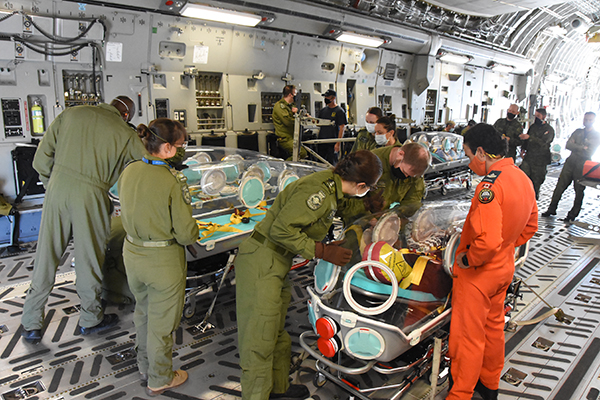Aeromedical Single Isolation Bio-containment Unit one step closer to achieving initial operational capability
November 3, 2020 – Defence Stories

Caption
Aeromedical evacuation crew, Search and Rescue technician prepare multiple ASIBU on CC117, 9 October 2020. Photo credits: Baz Kanda, RAWC.
In October an integrated test team from the Aerospace Engineering Test Establishment (AETE) and the 434 Operational Test & Evaluation Squadron evaluated the multi-fleet Aeromedical Single Isolation Bio-containment Unit (ASIBU).
The ASIBU is a reusable hard-shell capsule that carries one patient and allows medical staff to provide advanced medical care during transportation. Its hard shell provides safe operation in an aviation environment, including helicopter operations, and allows quick decontamination between missions. It can protect the environment from an infected patient, or protect a vulnerable patient from a contaminated environment. Also known as the EpishuttleTM, the ASIBU was designed by the EpiGuard Company.
This new piece of equipment is one in a series of emergency procurements pursued by the RCAF in the wake of the global pandemic with the aim of reducing the risk of contamination of medical teams, aircrew, and aircraft while transporting infected patients.
Testing was conducted in Trenton, Ontario with support from Aeromedical Evacuation and flight crews. Tests consisted of loading and unloading the patient unit, emergency ground egress and emergency procedures on four different aircraft – the CC130H, the CC130J, the CC117 and the CC138. Further testing is planned on the CH147F, the CH149, the CH148, the CC115 and the CC150 aircraft.
With the successful completion of the tests, the ASIBU is closer to becoming an integral part of CAF MEDEVAC operations at home and abroad.